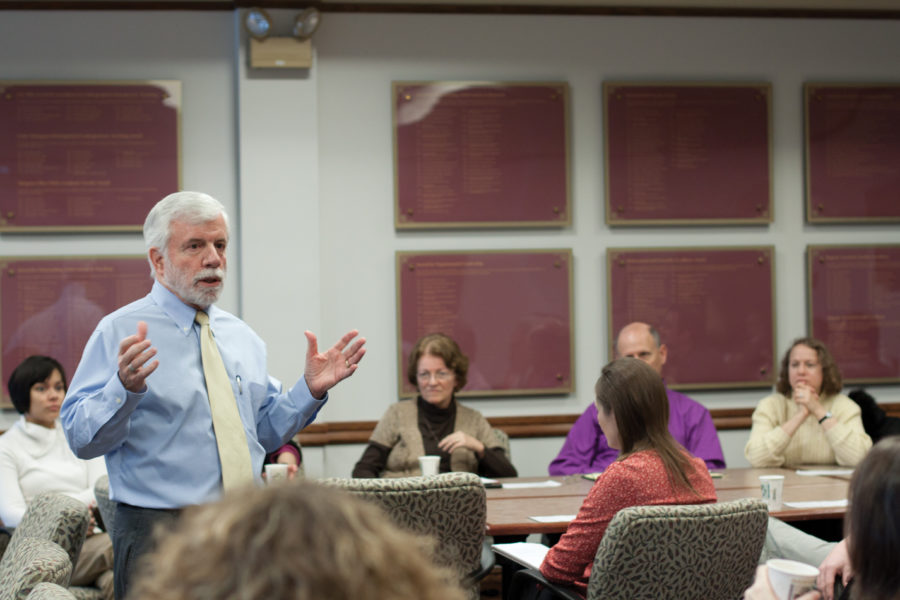Blue Sky Task Force criticized in open forum
Photo: Huiling Wu/Iowa State Daily
Mlchael Whiteford talks about ideas of how to face budget cuts during the LAS public forum Wednesday.
January 26, 2011
Faculty and staff from the College of Liberal Arts and Sciences criticized the dean and the Blue Sky Task Force report Wednesday morning.
The report to Michael Whiteford, dean of LAS, said the reason for the task force was to “streamline operations for a structurally smaller college, increase efficiency and generate financial savings,” among others.
Whiteford discussed several reasons why the task force was necessary, including $13.55 million the college has given up during the past three years and the anticipation of future budget cuts.
But faculty criticized how the task force was formed and how much money the report would actually save.
Several times throughout the meeting Whiteford tried to sway conversation away from the Blue Sky Task Force and toward money saving proposals.
“Forget about the Blue Sky proposals. I’m asking this group for proposals for this year and down the road. Rather than focus on Blue Sky let’s shift gears and talk about moving forward,” Whiteford said. “Look at this as another way to provide alternative suggestions.”
Michael Bugeja, director for the Greenlee School of Journalism and Mass Communication, said his biggest concerns involve retaining faculty.
“Those who came on board in 2005 and 2006 haven’t had a raise. It looks like they won’t have a raise for another six years,” Bugeja said. “The 2007 and 2008 cohorts are in deep trouble if you recognize the first thing that happens is they’re teaching more and don’t do research. How does a dean create a level playing field? The Blue Sky report had a linguistic character. If you put the word collaboration in place of interdisciplinary you have a paradigm.”
Whiteford said LAS has been protected from the full impact of budget cuts in the past because of the effects of stimulus money.
“It allowed us to postpone laying off colleagues and not hiring graduate students,” Whiteford said.
High enrollment is expected to drop off within the next couple of years, Whiteford said, but if it drops off immediately LAS could be in trouble. He said LAS alone has lost 62 faculty members through resignations and retirements.
“We’ve been hiring about a quarter of what we did two years ago and we’re doing it cautiously,” Whiteford said.
As a result, students have less variety in courses offered and faculty are finding themselves with fewer options that they can teach, he said.
“The task force didn’t provide us, and felt it wasn’t their job to do, the financial aspects of this,” Whiteford said.
One idea a faculty member shared was to reduce operation costs to force colleges to come up with the money.
Some faculty expressed concerns with how this project was “done from the top down instead of from the bottom up,” and said they wanted the entire college involved in the problem solving.
Another idea being discussed is the creation of a university college that would offer 100- and 200-level classes.
Whiteford said the meeting was “the first of several coffees to be had.”
There will be two more open forums: Jan. 28 and Feb. 1 in 302 Catt Hall.

















